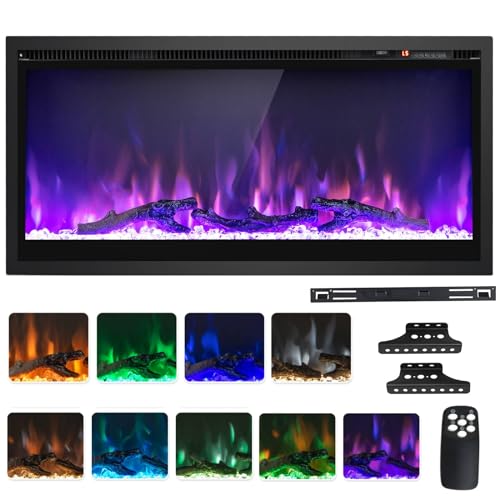Nine Things That Your Parent Teach You About Wood Burning Fireplace
페이지 정보
작성자 Stephaine 작성일 25-01-06 13:33 조회 4 댓글 0본문
 Why Does My Wood Burning Fireplace Produce Less Heat?
Why Does My Wood Burning Fireplace Produce Less Heat?There's nothing like a warm wood fire on a cold evening. Many homeowners choose fireplaces made of wood as the primary heating source for their homes.
Wood burning fireplaces require regular maintenance and cleaning to ensure they're functioning properly. This includes chimney sweepings and inspections, and also avoiding burning wood that is wet or not seasoned.
Efficient Heating
Wood burning fireplaces are a beautiful addition to any house and provide warm natural, cozy heat. Many homeowners are unsure what causes their fireplace to produce less heat than they would imagine. The reason is based on a variety of factors such as the type and amount of wood used in the fireplace as well as the method in which it is constructed.
To burn, wood must be combusted to release hot gasses. Wood combustion is a complicated process that involves three stages that include dehydration (drying out) gasification (gasification) and burning charcoal. During the initial stage, the wood's water evaporates, and the organic material begins to decay. This produces flammable gasses. These gases ignite and cause the wood to burn. This releases a lot heat. The amount of heat released is measured in British Thermal Units (BTUs) which is the amount of energy required to raise a pound of water by one degree Fahrenheit.
Open fireplaces can draw up to two hundred cubic feet per minute of air into the chimney. This heats the air inside your home and also eliminates the unwanted byproducts that result from burning wood. This can decrease the heating capacity of your home and lead to drafts. Utilizing a high-efficiency wood burning fireplace that is EPA certified can help reduce this issue and improve the heating capacity of your home.
It is essential to build a fire with the longest time possible and make use of the correct type of wood. Dry or mature wood burns more efficiently and produces less smoke and creosote buildup. Dry wood is also more easy to light and burns at a higher temperature that maximizes the production of heat.
It is also important to ensure your home is well-insulated and ensure that all vents are sealed to prevent cold air from entering your home through these sources. The use of fans is a fantastic way to spread the heat from your fireplace to the rest of your home instead of sending it up the chimney.
Environmentally Friendly
The crackling sound, natural scent and flickering flames of wood fireplaces create a warm, inviting space. Many homes also have a more traditional look with wood fireplaces. The heat of a fireplace is wonderful, but the radiant heat that comes from the burning coals makes a fireplace comfortable and enjoyable. In addition, the ashes are useful in fertilizing the soil and gardens, as well as decreasing toxic compounds like arsenic and lead.
A traditional wood stove has a low environmental impact, as long that the fuel is harvested responsibly and burnt in a fireplace that is efficient. Unsustainable logging practices can lead to destruction of forests, causing disruption to ecosystems and causing environmental damage. The wood used in a fireplace must also be properly prepared and stacked to ensure proper combustion, which can reduce emissions.
The moisture in damp, rotten or mouldy wood releases pollutants like particulate matter and carbon monoxide when it's burned. These pollutants can be harmful to humans and can worsen respiratory illnesses, particularly in those with health problems like asthma. By requiring wood woodburning stoves to burn cleaner, the government is helping improve air quality.
Modern stoves emit less carbon dioxide and other harmful gases in the atmosphere. They can achieve this through the use of different fuels, like pellets made from recycled very small wood burning stove, which are more efficient than traditional logs. These stoves also come with catalytic combustors that further reduce emissions.
Gas fireplaces are another option. They use electricity generated by fossil fuels that are derived from coal. They produce fewer greenhouse gasses than wood-burning stoves. The combustion process creates Nitrous dioxides as well as other harmful pollutants that can contribute to global warming and poor air quality.
It's important to consult an expert on fireplace installation and safety to ensure your home is built to local building codes and complies with safety regulations, which will help prevent the risk of fire and carbon monoxide poisoning. A professional can also offer advice on the best ways to maintain and use your fireplace, maximizing its capacity to warm your home and reduce emissions. Furthermore, fireplace accessories like blowers or heat exchangers can aid in spreading warmth more evenly throughout the home.
Aesthetically appealing
A wood burning fireplace offers warmth that transforms a frosty evening into a welcoming space. The fireplace is not only a source for heat; it's also a focal feature that encourages conversation and activity. If it's traditional, with intricate stone or sleek and contemporary in style, the ideal fireplace will match your aesthetic preferences and enhance your home's unique style.
The roaring of flames, occasional sparks that look like fireworks, and even a woody odor, such as fir, give a fireplace an organic look. This creates a cozy atmosphere in any space. If you decide to install an open hearth fireplace, adding decorative elements and carefully chosen accessories can add to the aesthetic appeal of your home.
Wood fireplaces are beautiful and unique, but they require regular maintenance. This includes cleaning. It is essential to regularly clean out the ash and make sure that the chimney doesn't become blocked or overloaded. Gas fireplaces are a low-maintenance option for those looking for an energy-efficient fireplace that requires little maintenance.
As technology improves, consumers are increasingly seeking out energy-efficient heating systems for their homes. The good news is that modern, gas-powered fireplaces offer many of the same appealing benefits of a traditional wood burning stoves on sale burning fireplace but without the need for regular maintenance or the dependence on flammable fuel sources.
Electric fireplaces can be hardwired or plugged into an outlet and come in various designs. Certain models can be wall-mounted or freestanding, while others are wall-mounted. They simulate real flames by using LED lights and speakers emitting crackling sounds. They're not the most efficient form of heat source, but they are a great alternative to a wood-burning fireplace or if you don't have a space for traditional hearths.
It is important to make the right decision for your home. The fireplace you select will not only affect the way your living space is used, but it can also impact the value of your home. Make sure to speak with an expert to determine the ideal fireplace for your needs.
Low Maintenance
Wood fireplaces are an excellent alternative for those looking to reduce their dependency on fossil fuels. Firewood is a renewable resource and can be sourced from local forests and then purchased locally to support the community. It is also a more economical alternative to heating oil and natural gas. It releases less pollutants and also creates a clean atmosphere. It is crucial to use wood that has been treated to your fireplace. The wood that is seasoned is less likely to create dangerous creosote.
It is essential to maintain your chimney system regularly to ensure it is operating properly. A blocked fireplace can release harmful byproducts such as carbon monoxide, smoke and other byproducts. The chimney is recommended to be cleaned at minimum every year to get rid of creosote and other debris that has been accumulated from the fire chamber and flue. It is also recommended to sweep the firebox regularly to keep it tidy and to avoid excessive buildup.
A fireplace that burns wood can serve as a backup source of heat in the event of an outage. Storing firewood that is seasoned allows you to keep your home warm for several days without having to use your generator. This is a great method to cut down on your dependence on utilities and prepare for any power outages that could occur due to winter snowstorms and ice storms which could damage trees or damage wires.
Wood burning fireplaces are also popular for their ability to create a smoky, roaring fire that adds an authentic look to any room. The smell and sound of a fireplace wood-burning fireplace is unmatched by other alternatives. It can make a space feel cozy and warm and is perfect for hosting family and friends.
Our experts can assist you in understanding the advantages of a wood fireplace as a traditional source of heating. Contact us today to begin!

- 이전글 Guide To Best Couple Toys: The Intermediate Guide In Best Couple Toys
- 다음글 A Step-By'-Step Guide To Picking Your Best Ovens
댓글목록 0
등록된 댓글이 없습니다.
